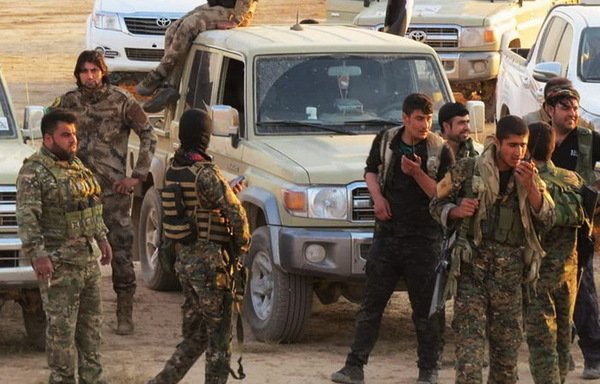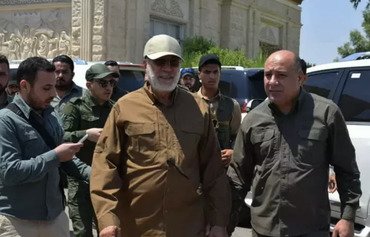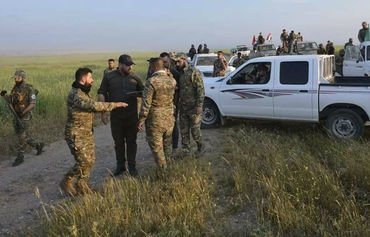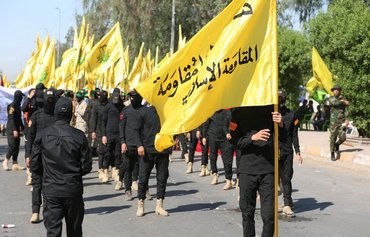The Iraqi government has been working to rein in Iran-backed militias operating in Ninawa Plains and take firm control of the security situation amid recent challenges to state authority.
The move comes as the dominant militia in that region -- the 30th Brigade of the Popular Mobilisation Forces, led by Waad Qado -- continues to defy government orders to vacate its headquarters and withdraw from the area.
On August 5th, Iraqi Prime Minister Adel Abdul Mahdi issued a directive calling on the 30th Brigade to withdraw from all checkpoints under its control in the Ninawa Plains area.
This met with strong resistance from the brigade, whose leaders mobilised their followers and instructed them to block the Mosul-Erbil road. The militiamen also burned tires and threw stones at police and army forces.
Two days after the road was blocked, the Iraqi government sent a high-ranking military delegation to negotiate with 30th Brigade commander Qado, who is on a US sanctions list.
The delegation decided that the army, police and 30th Brigade would exercise joint control over the area, a move that enraged the local population.
The 30th Brigade's actions are "nothing short of outright mutiny against the state and high military commands", Ninawa tribal spokesman Sheikh Muzahim al-Huweit told Diyaruna.
He accused the militia of taking its orders from Iran's Supreme Leader, Ali Khamenei, and serving the interests of Iran rather than Iraq.
The security of Ninawa Plains should be in the hands of the local police force, Ninawa provincial council member Ghazwan al-Daoudi told Diyaruna.
Militia exploited its position
The 30th Brigade "has refused to implement the orders of the Prime Minister to withdraw from the checkpoints", Iraqi MP Shirwan al-Dobardani told Diyaruna.
He called for the removal of militiamen from all checkpoints on the outskirts of Ninawa, saying the 30th Brigade is "blackmailing the local population and taking bribes from truck drivers and business owners at the entry points into the city".
The militia's defiance stems from its determination to defend its economic interests in the region, political analyst Ghazi Faisal Hussein told Diyaruna.
The 30th Brigade allegedly generates $2 million per day from extortion and fees imposed on commercial truck drivers at its checkpoints in Ninawa Plains, he said, and from forcing merchants to pay it a percentage of their profits.
The militia's defiance shows the clear contradiction in its position, he said, noting that it claims to be a part of the official state apparatus and to be in compliance with decisions issued by the Prime Minister.
In truth, however, the 30th Brigade and other Iran-backed militias in Iraq follow the orders of Iran's Islamic Revolutionary Guard Corps (IRGC), he said.
The IRGC has been propagating the notion that Iraqi security forces are incapable of protecting the Iraqi people alone, and that the militias – which it supplies with weapons and money – are necessary for Iraq's security, he said.
Curbing paramilitary groups
The Iranians aspire to turn these paramilitary forces into an alternative to the regular Iraqi forces, Hussein said, mimicking the IRGC's relationship to the Iranian military, and to weaken the institutions of the Iraqi state.
The Iraqi government has repeatedly stated it will not allow any armed group to overstep the rule of law, he said, noting that despite the pressures and challenges it faces, it is moving forward with its plan.
This includes curbing the influence of paramilitary groups, particularly those backed by Iran, he said.
Abdul Mahdi on August 10th affirmed his determination to oversee a gradual removal of all unauthorized checkpoints in Ninawa Plains, and to see to it that Iraqi forces will be solely responsible for manning the remaining checkpoints.
In an interview with Iraqi media, he said implementing an administrative order issued in July to declare PMF factions that do not comply with government decisions to be outside the law will be "difficult and complex".
But it will be done, he added, noting that it will require a timeline of one to six months to implement.









It has to stop.
Reply7 Comment(s)
Unnecessary website.
Reply7 Comment(s)
Not good.
Reply7 Comment(s)
I hope this website will be shut down.
Reply7 Comment(s)
This site incites sedition.
Reply7 Comment(s)
Incitement and commotion.
Reply7 Comment(s)
Iraq is coveted by all. Therefore, its wealth must be preserved.
Reply7 Comment(s)